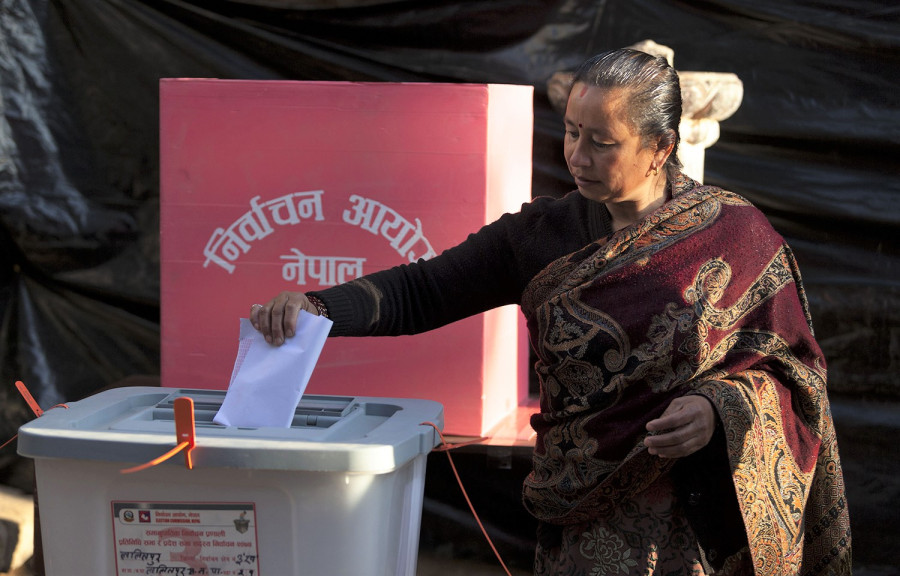Columns
Worth the investment?
Failure to maintain financial transparency in political parties allows for the criminalisation of politics.
Shristi Rai
As the global economy recovers from pandemic-induced extremes and the indirect consequences of the Ukraine conflict ramifications, its impact on the cost of edible foods, trade and imports, petroleum products, and other basic necessities can be felt strongly. In order to overcome this challenge, which is wreaking havoc on our country's feeble economy, an inclusive recovery is a topmost priority. Nepal recently completed its House of Representatives (HoR) and Provincial Assembly elections in the hope of "envisioned change". This election is anticipated to be the most expensive, with the Ministry of Finance budgeting Rs8.11 billion for the Election Commission alone, and the EC budgeting up to Rs10 billion. Amidst a soaring trade deficit and depleting foreign exchange reserves, will this nation still remain apt to the challenges that are yet to come on its way, that too after commencing one of the most expensive elections to date?
The high cost of starting this election may increase overhead costs, making it even more overdue for its citizens. According to the monetary policy 2022-023 report published by Nepal Rastra Bank, inflation has increased from 4.4 percent at the start of the fiscal year to 8.6 percent at the conclusion of the preceding fiscal year. Concerns have been raised about Nepal's economic ability to cover the cost of these elections in the face of rising inflation and diminishing foreign reserves, which pose a greater barrier to the inclusive recovery we aim to achieve.
Political façade
The electoral integrity framework (EIF), as one of the crucial elements, measures transparency by identifying accurate and credible sources. This code of conduct adheres to both government bodies and civil society as the focal point of law and order enforcement mechanisms. Many of the regulations require ensuring electoral democracy, including the Election Commission Act 2017, the Election (Offense and Punishment) Act 2017, the Political Parties Act 2017, the Local Election Act 2017, the House of Representative Member Election Act 2017, and the Provincial Assembly Member Election Act 2017. It is the responsibility of the Election Commission to regulate and control the illicit use of money and power through effective implementation, as well as to ensure that the code is not violated. Although there have been exposed cases that contradict law and order, many of these can be seen in the election expenditure rates among the contending candidates.
The campaign finance section of the Electoral Integrity Framework generates guidelines for legitimate sources of campaign financing. The portion states that electoral integrity uses established parameters such as the candidates’ capacity to collect public subsidies, their capacity to obtain political donations, their financial transparency, the influence of financiers, and their use of state resources through three main sources of finance: i) public money sources are directly from the government; ii) private fundraising comes from individual investment and institutional supporters of the candidates or parties; and iii) party financing comes from the party's internal sources. These finances too have limitations and certainly do not warrant a billion dollar expenditure.
An important regulation in the election code of conduct is the fixation of the election campaign expenditure limit. This limit is also meant to increase the participation of supporters in the candidate’s election finance and maintain the independence of candidates’ accountability to their constituency. Against the backdrop of the country's liquidity crisis and other vulnerabilities, the elections mean a significant opportunity cost for a developing country like Nepal. Along with casting democratic legitimacy into doubt, it also introduces anomalies and disrupts the core foundation of just equilibrium in society. As an autonomous body that maintains the decorum, the commission undertakes full responsibility for the commencement, just as how we have recently witnessed the process of election; now, we anticipate for favourable and reliable candidacy to bring this inclusive recovery and change that overturns the economy of this nation.
Paradoxes in sustainable democracy
Elections restore our faith in democracy and guarantee our right to vote, but has it ever been sustained? We can only hope for the rightful results to be announced. In the party coalitions, only a few candidates’ leadership truly stands out among others who leach onto the parties’ vested interests for the seats rather than their manifestos. Because the Election Commission has failed to execute the code of conduct, Nepal's elections are getting increasingly expensive, and contesting them is now out of reach for the average candidate. Failure to maintain financial transparency in political parties not only facilitates corruption but also allows for the criminalisation of politics.
An alternative point to think about is that if the huge amount of money that has gone into election costs were to be invested in building a better social protection system for the public, it would yield visible gains and socio-economically impactful progress for the country. Accessible healthcare and services, quality education, and a greater emphasis on research and development as well as other initial soft developments would go a long way, with even higher returns both monetarily and skillfully.




 18.12°C Kathmandu
18.12°C Kathmandu















